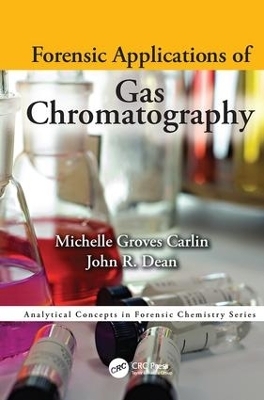
Forensic Applications of Gas Chromatography
CRC Press (Verlag)
978-1-138-42677-1 (ISBN)
Several areas of forensic science use the technique of gas chromatography, ranging from fire analysis to the investigation of fraudulent food and perfumes. Covering the essentials of this powerful analytical technique, Forensic Applications of Gas Chromatography explains the theory and shows applications of this knowledge to various realms of forensic science.
Topics include:
A brief introduction to gas chromatography and its use in forensic science
Various components that make up the gas chromatographic instrumentation
The theory of the separation process, along with the chemistry underpinning the process
Method development, with a specific example of a separation of eight different compounds using a gas chromatography-flame ionization detector
Quality assurance and method validation with information applicable to many types of analytical testing laboratories
Troubleshooting in gas chromatography systems
New developments in gas chromatography and advances in columns and detectors
Real examples supplement the text, along with questions in each chapter. The book includes examples of applications of gas chromatography in drugs, toxicology, fire, paint, food, and fragrance. Each application is presented as an individual case study with specific focus on a particular sample preparation technique. This allows each technique to be discussed with respect to its theory, instrumentation, solvent selection, and function, as appropriate. Each case study provides readers with suitable practical information to allow them to perform experiments in their own laboratory either as part of a practical laboratory class or in a research context. The final chapter provides answers to the questions and encourages further study and discussion.
John Richard Dean, Michelle Groves Carlin
Introduction to Gas Chromatography. Instrumentation for Gas Chromatography. Choice of Gas. Sample Introduction. Column Oven. GC Columns. Detectors. Basic Principles of Chromatography. Theory of Chromatography. Method Development. Influence of Sample Introduction Method. Influence of the Carrier Gas. Influence of the Column. Influence of Oven Temperature. Influence of the Detector. An Example. Quality Assurance and Method Validation. Quality Assurance. Quality Control. Why Be Quality Assured?. Ways to Ensure Quality of Product or Service. Instrument Qualification. Method Validation. Troubleshooting in Gas Chromatography. Introduction. Baseline Disturbances. Irregular Peak Shapes. Retention Time Shifts. Loss of Separation or Resolution. Loss of Sensitivity. Rapid Column Deterioration. Ghost Peaks. Developments in Gas Chromatography. Developments in Sample Preparation Techniques. Developments in Column Technology. Developments in Instrumentation. Forensic Applications of Gas Chromatography. Drug Analysis. Forensic Toxicology. Forensic Analysis of Fire Debris. Paint Analysis. Food and Fragrance Analysis. Answers to Questions. Glossary. Index.
| Erscheinungsdatum | 07.10.2017 |
|---|---|
| Reihe/Serie | Analytical Concepts in Forensic Chemistry |
| Verlagsort | London |
| Sprache | englisch |
| Maße | 156 x 234 mm |
| Gewicht | 385 g |
| Themenwelt | Naturwissenschaften ► Biologie |
| Naturwissenschaften ► Chemie ► Analytische Chemie | |
| Recht / Steuern ► EU / Internationales Recht | |
| Recht / Steuern ► Strafrecht ► Kriminologie | |
| ISBN-10 | 1-138-42677-6 / 1138426776 |
| ISBN-13 | 978-1-138-42677-1 / 9781138426771 |
| Zustand | Neuware |
| Haben Sie eine Frage zum Produkt? |
aus dem Bereich


